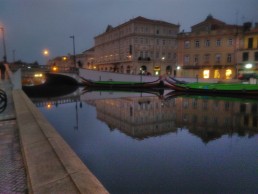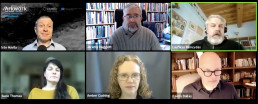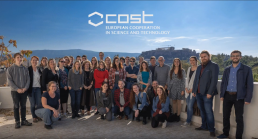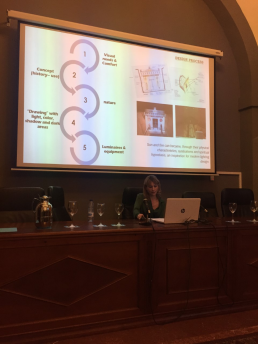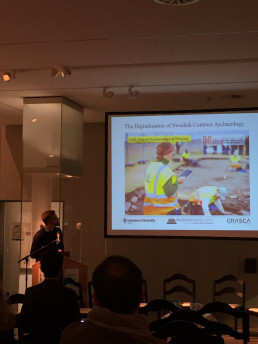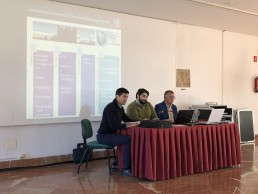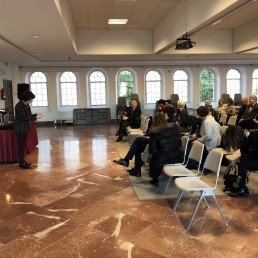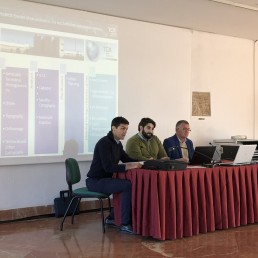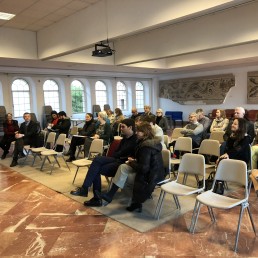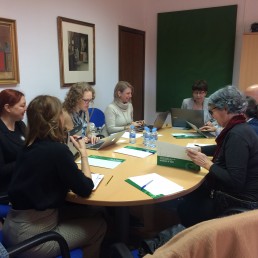Final conference materials online
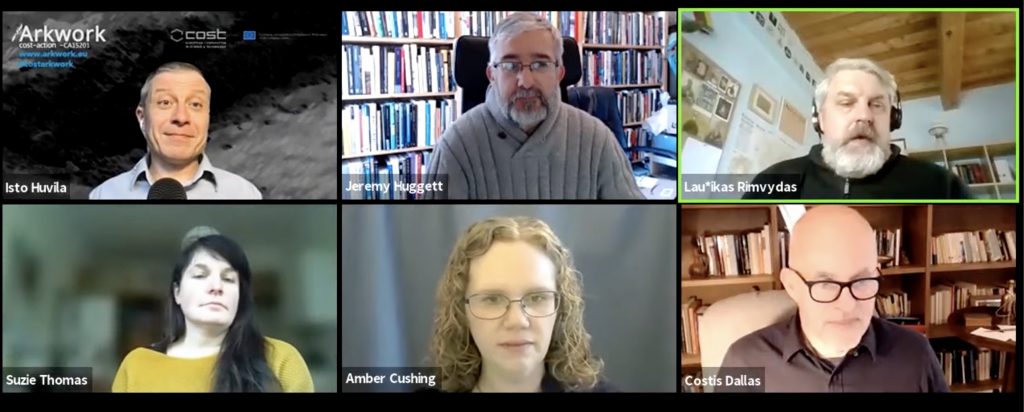
Recordings and slides from the Final Conference (Feb 10, 2021) are available on the conference webpage at https://arkwork.eu/activity/final-conference/
COST-ARKWORK Final Conference
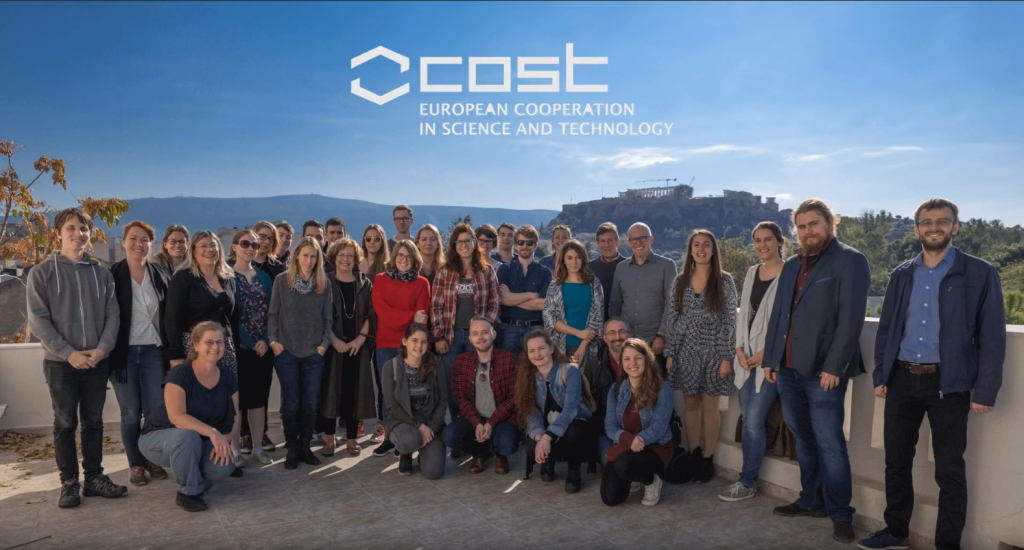
COST-ARKWORK is a network funded by the COST scheme that brings together the multidisciplinary work of researchers of archaeological practices in the field of archaeological knowledge production and use. The aim of the network is to make a major push forward in the current state-of-the-art in knowing how archaeological knowledge is produced, how it is used and how to maximise its positive impact in the society. The focus of ARKWORK is on training the next generation of scholars and stakeholders by involving future leaders of research but also high profile experts employed by the industry and public organisations through events and visits to foreign institutions is a key to the longevity of the outcomes.
After four years of intensive work, COST-ARKWORK invites participants to an online final conference on Feb 10, 2021. The programme consists of keynote lectures, showcasing of the work conducted in the network, an industry forum roundtable, and an open forum for presentations of work related to archaeological practices and knowledge work in the digital environment.
More about the conference at the conference web page at https://arkwork.eu/activity/final-conference/
Dispelling Shadows: Light, Built Spaces, and Archaeological Practices

Conference report by Pedro Luengo
On February 20th 2020, the Universidad de Sevilla (Spain), thanks to the support of COST Action CA15201 Archaeological practices and knowledge work in the digital environment, organised a conference on how light analysis have been gradually incorporated to archaeological studies.
Under the title "Dispelling Shadows: Light, Built Spaces, and Archaeological Practices" scholars from Greece, Israel, Spain and Portugal presented their different perspectives on this topic from a multidisciplinary approach. The presenters included architects, archaeologists, art historians, or engineers.

First, the presenters discussed about how digital tools allow now to analyse the ancient management of both sun and artificial light. This is important to better understand historical space and the functions of pieces such as lamps or candles. From this perspective, aesthetic questions such as how the interior lighting evolved, or which kind of activities were developed under such circumstances can be addressed, including an intangible aspect on heritage analysis. Second, light is also a tool for heritage enhancement.

On one hand, monuments are being reshaped by artificial lights giving them a new (touristic) meaning. Only in some cases designers have shown their concern on how this can be used to give a better explanation on the historical or artistic features of the structure. In addition to these aspects, sustainability as a wide term is gaining attention. Proposing sustainable solutions from a environmental perspective seems obvious under current circumstances, but also the concept of sustainable tourism is relevant here. While the monuments might promote a spectacular image of the city, this must be done as part of a process of promotion on local societies.

Archaeological remains must be first part of current societies, and as a consequence, a touristic attraction. Finally, heritage lighting also affects museum displays since they have to balance historical explanation with current accessibility requirements. As conclusion, the importance of a scientific and multidisciplinary approach to light in archaeology was reinforced. Previous initiatives, mainly based on personal taste, must be turned to deeper proposals which underline both preserved heritage and its intangible features.
Industry forum on contract archaeology
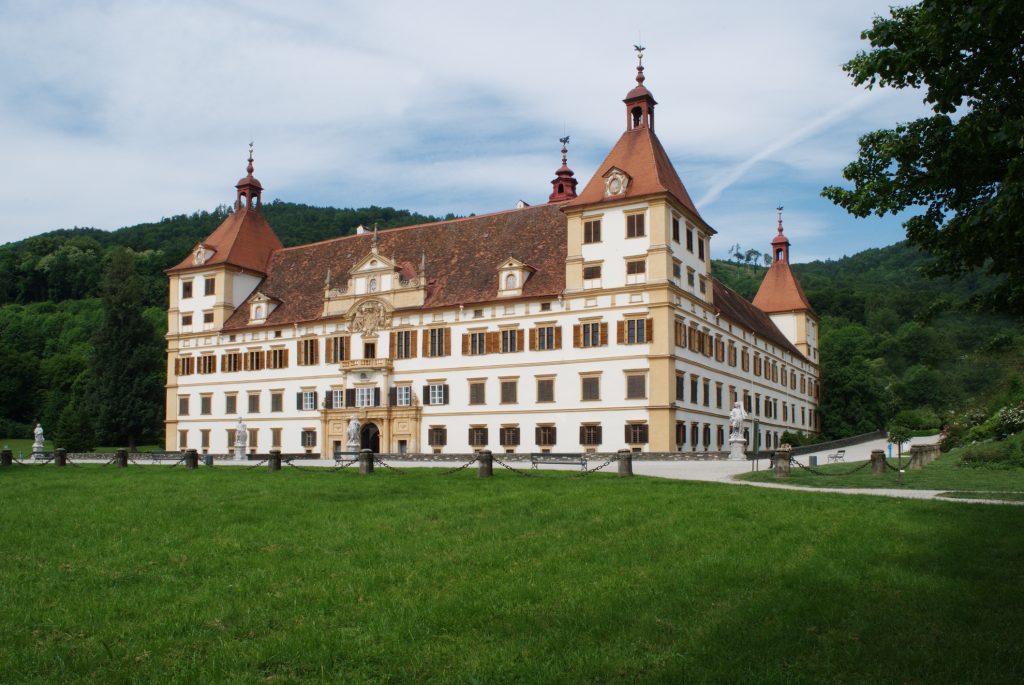
The first COST-ARKWORK Industry forum organised in Graz Jan 17-18, 2019 brought together contract archaeologists and policy makers from countries all over Europe. The principal goal of the forum was to further the exchange between contract archaeologists and policy makers. With this goal in mind, the forum incorporated several discussion sessions in small groups and a whole afternoon dedicated to the policy maker panel, where the policy makers of 9 European countries discussed the backgrounds and differences of their policies.
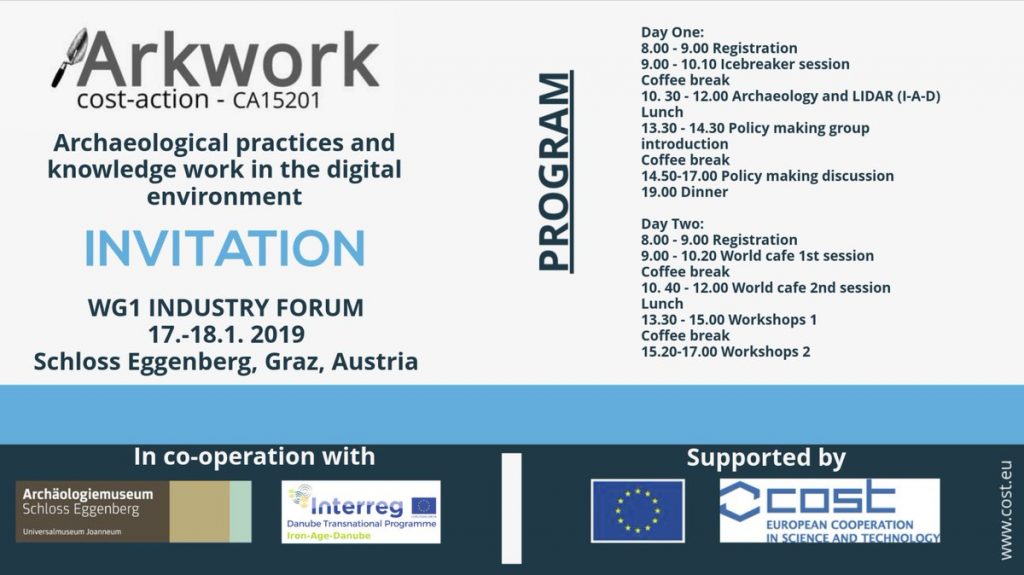
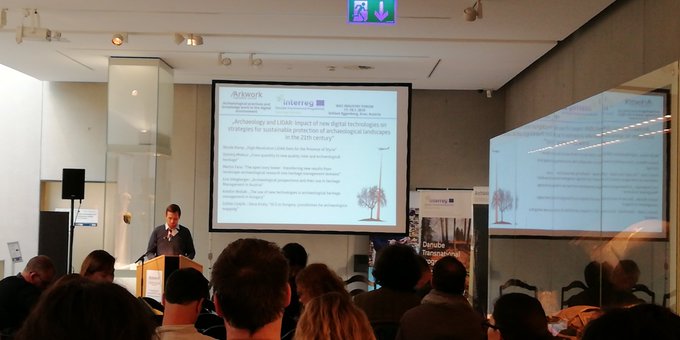
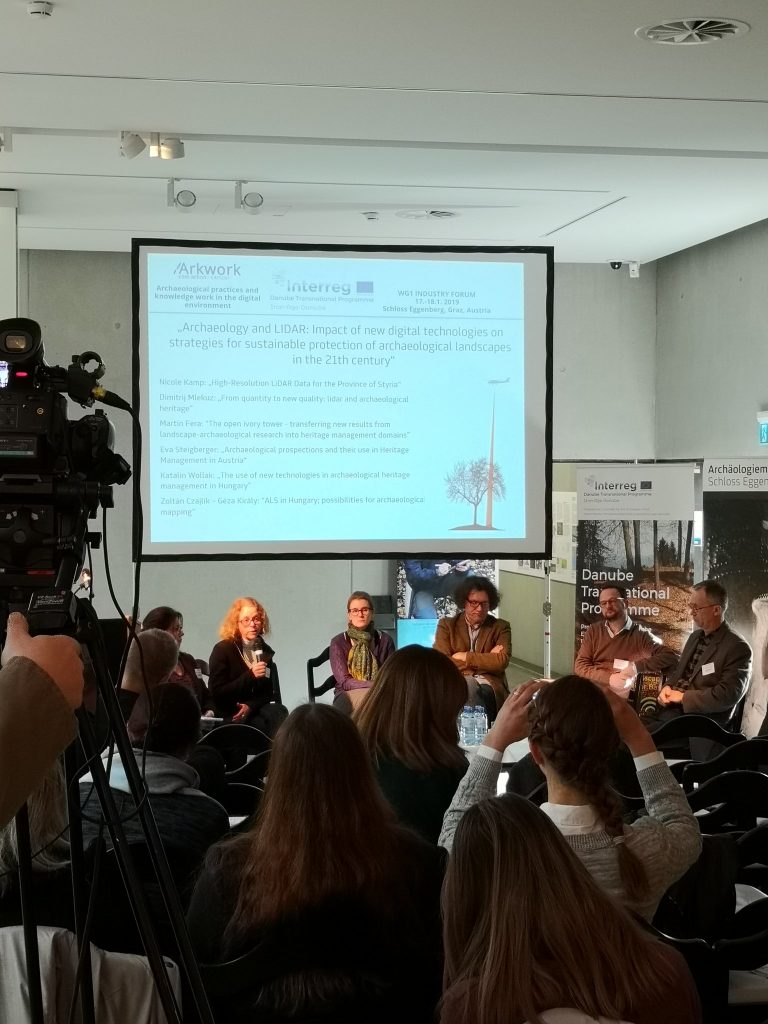
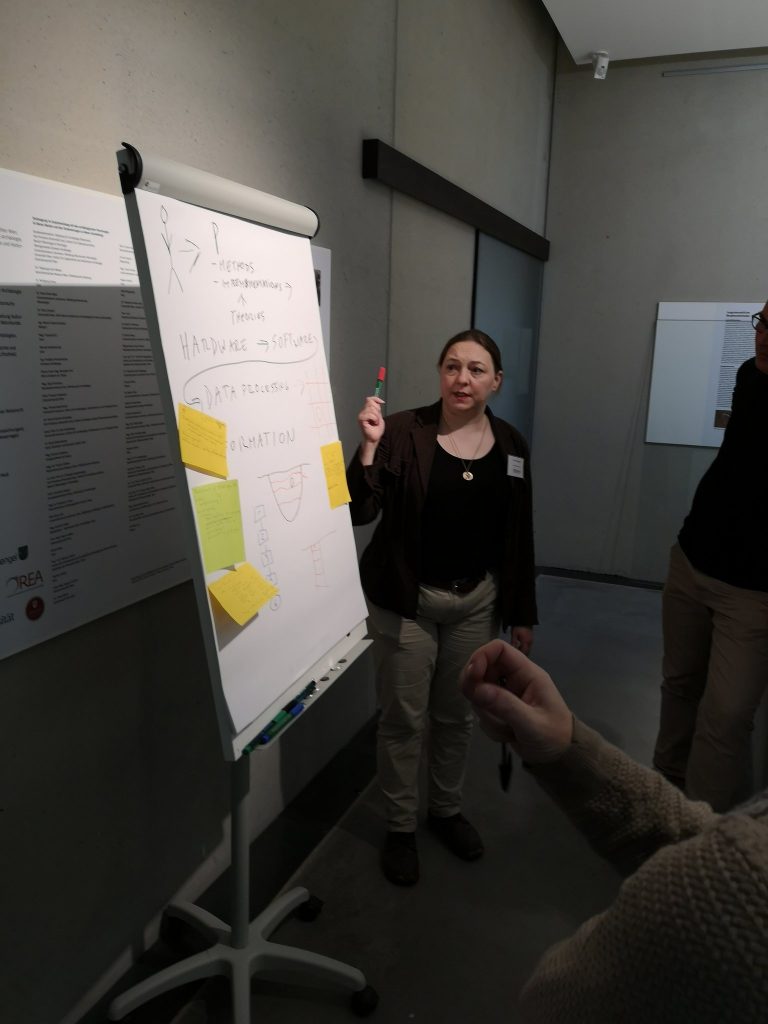
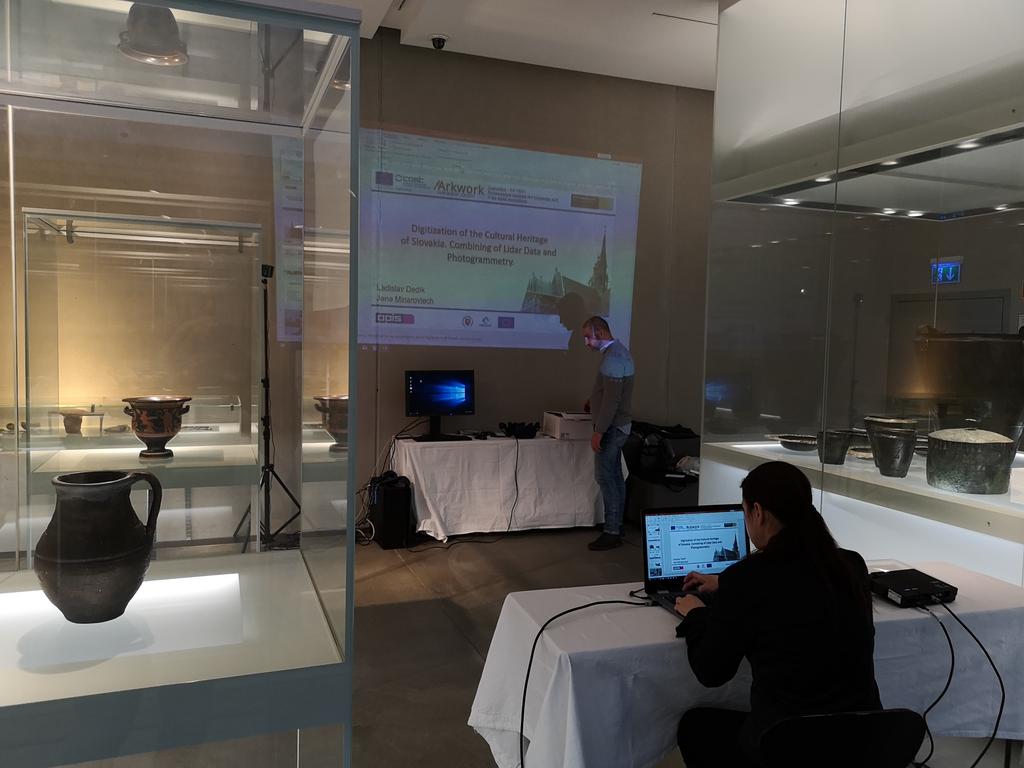
CFP: User Experience Design in Archaeology and Heritage
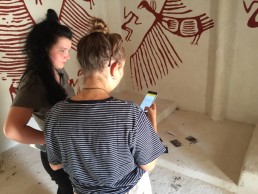
CAA International Conference in Kraków, Poland, 23-27 April, 2019
· Are you designing digital resources for different archaeological users – specialists and wider audiences alike?
· Do you deploy – or do you want to deploy – methods from the UX (user experience) and participatory design fields?
· What workflows do you follow in iteratively developing your digital outputs? How are end users and stakeholders involved throughout these workflows?
· What evaluation methodologies are you using to assess the successes and failures of your digital work with diverse audiences?Please join us to explore these questions (and more!) in our Roundtable Session #S36 on User Experience Design in Archaeology & Cultural Heritage at the CAA International Conference in Kraków, Poland, 23-27 April, 2019.We welcome all contributors who are working to integrate archaeological/heritage data and digital platforms into experiences that are truly tailored to the needs and expectations of their users.We seek to discuss your iterative methodologies, your users’ experiences, and your lessons-learned in order to refine user experience design models & toolkits for the archaeology and heritage sector.
The full abstract for our session is pasted below. This is a discussion-focused session and papers should be ‘flash’ in nature – i.e., no more than 10 minutes – and will be pre-circulated to allow us to delve into specifics during moderated discussion periods.
Deadline for submission of abstracts is Wednesday 10 October 2018.
To apply: Submit an abstract of no more than 250 words, excluding session title, author names, affiliations, and email addresses as well as 3 – 5 keywords. Please go to the CAA conference website (https://ocs.
This roundtable is part of the EU COST ACTION network ARKWORK: https://www.arkwork.
We hope you can join us!
User Experience Design in Archaeology and Cultural Heritage (CAA conference, Session 36)
Francesca Dolcetti (University of York)
Rachel Opitz (University of Glasgow)
Sara Perry (University of York)
Despite the widespread dissemination of digital tools and applications in both archaeology and heritage, relatively little is known about their real effectiveness and impact on diverse audiences (specialists and lay publics alike). A new iterative design workflow, involving end users and stakeholders from the outset, as well as an accompanying design evaluation methodology, may open new avenues for engagement while, at once, constructively influencing our research objectives and epistemologies.
In this Roundtable session, we seek to bring together a multidisciplinary group looking at different aspects of archaeological knowledge production to discuss theoretical and methodological issues in the field of participatory design and user experience, and to foster a critical understanding of how this knowledge is used and its social impact. Our aim is to convene researchers and practitioners in a dialogue that is focused on examples of interdisciplinary co-creation and user testing of Augmented, Virtual and Mixed Realities (AR, VR, and MR) and related digitally-mediated experiences for museums, archaeological and cultural heritage sites, and varied teaching and research contexts. We are particularly interested in practical experiences around how to integrate archaeological data, storytelling and digital platforms to create experiences truly tailored to the needs and expectations of users.
The format of this Roundtable is a series of flash position papers (10 minutes maximum) followed by periods of moderated discussion. The session concludes with an open floor discussion and a wrap-up report summarising the discussion and suggesting follow-up activities. Position papers will be submitted in advance to the session chairs and shared with all panelists. The session welcomes participants from different sectors including but not limited to digital humanities, archaeology, museology, design research and Human-Computer Interaction (HCI).
Workshop "What are archaeological practices" in Aveiro
On the 5. and 6. October we met in beautiful Aveiro to discuss what archaeological practices are and to meet in the working grops. The event was hosted by the University of Aveiro. Here you can find two of the insightful presentations that we heard in the workshop.
